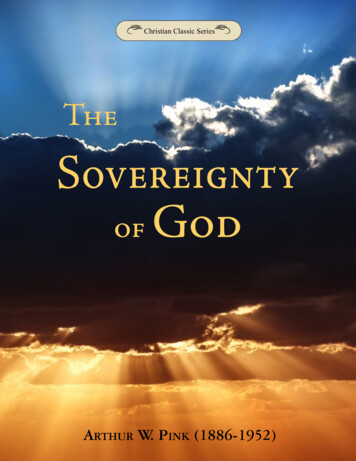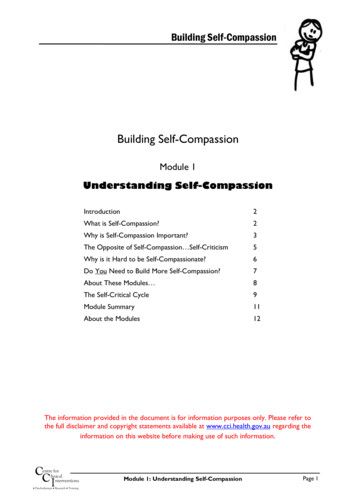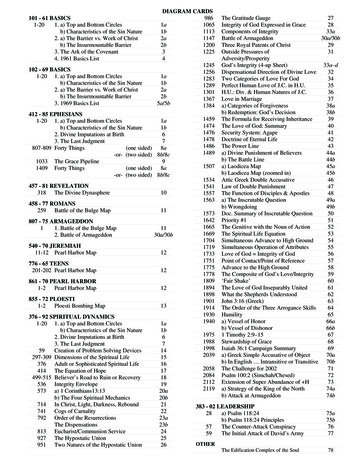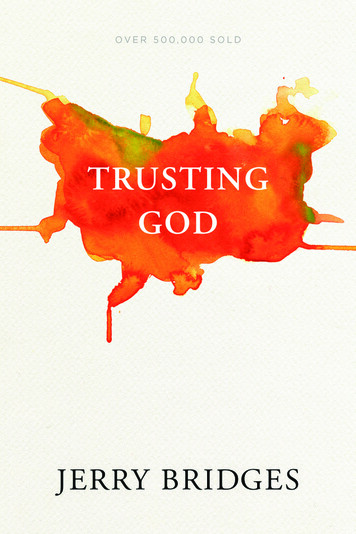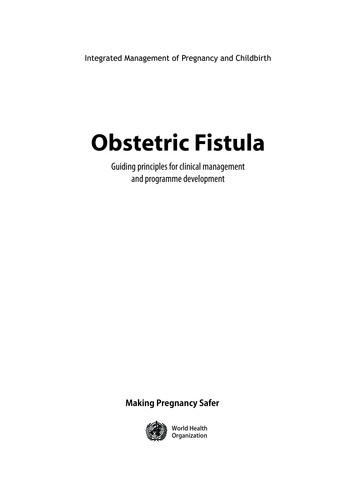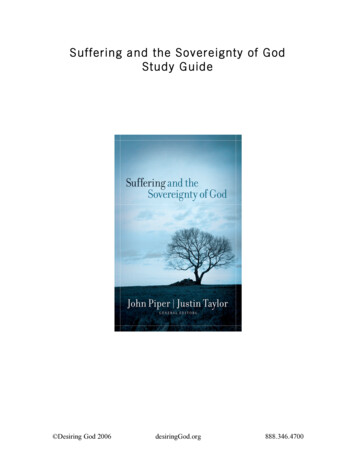
Transcription
Suffering and the So v er eignty of GodStudy Guide Desiring God 2006desiringGod.org888.346.4700
Explanation of the Study Guide .2Reading and Viewing Plan .4Study Q uestions .5 Desiring God 2006desiringGod.org888.346.47001
Explanation of Study ResourcesIn an effort to encourage discussion and deeper engagement with Suffering and the Sovereignty of God , we havedeveloped a ten-week study of the book. The following sections explain the Reading and Viewing Plan, the Study Guideitself, and recommendations on structuring this group study.We feel that these study resources would work best in a group setting. Not only do we believe in the biblical principle thatiron sharpens iron, we also long to see church communities strengthened together in the foundations of the gospel.Nevertheless, we hope that these study resources can also be of benefit for individual study and reflection. If an individualwere to utilize these resources, that person should feel free to use whatever portions of these resources would mosteffectively help them learn more of Scripture and treasure more of God in Christ.R e ading and Vie wing Pl anWhere possible (see Group Time below), each week consists of reading a portion of the book, viewing (when applicable) acorresponding message on DVD, and answering/discussing study questions relating to the material. We have broken downthe readings and viewings into ten separate weeks. Generally, one chapter from the book and one corresponding sessionon the DVD will be covered each week. You will notice, however, that certain weeks cover two chapters/sections in thebook, other weeks have no corresponding DVD session to view, and two weeks will only cover half a chapter. You will alsonotice that the study progresses in the order of DVD sessions, rather than the order of chapters in the book. Making sureyour group is aware of the schedules shifts and turns will aid in the study’s smooth progression.**Note: If you decide to use only the book and not the DVD set (see Group Meeting below), you may choose to read thechapters from week to week in the order they appear in Suffering and the Sovereignty of God . Progressing this way seemsclearest and most straightforward, and would be the easiest for a group to follow. In such cases, however, we would stillsuggest breaking the reading of chapter 2 into two weeks (see weeks 4 and 5 in the Reading and Viewing Plan), readingchapters 4 and 5 in one week (see week 7) and Appendices 1 and 2 in one week (see week 2).Study GuideThe study guide contains questions for the individual to think and ponder as they read during the week. These questionsare aimed at deepening one’s understanding of the reading, provoking one to further study and thought, and stirringpersonal reflection and application of the themes and biblical truths covered.The questions appear in the order they are discussed in the book, and most questions will have key page numbers forquick reference. The individual may choose to answer these questions during their reading, or after their reading as ameans of review and reflection.Each individual should decide for themselves what pace to work through the weekly reading and study material. We haveprovided a suggested pace of five daily readings with two corresponding study questions per day. These daily allotmentsappear in the study guide.You will also notice that five questions per week appear in the study guide in bold letters. For more on these questions seeGroup Meeting below.G r oup Me e tingWe believe that the group meeting is an extremely valuable time for discussion, reflection, internalization of the materialcovered, and prayer. We have selected questions from the Study Guide which we feel would be helpful and fruitfulquestions for group discussion. These questions appear in bold lettering within the study guide. There are five suchquestions that appear for each week’s reading. If you feel that other questions in addition to or instead of the questionswe have selected would be of more benefit to your group, please do not hesitate to lead your group in those directions. Orif you are able to develop questions of your own that would better fit your group or touch on other areas that needdiscussion and reflection, again do not hesitate to do so. Our hope is that the Study Guide will be a resource that gets youstarted and that launches other creative and worthwhile efforts to deepen knowledge, faith, and love.We also want to encourage extended times of group prayer during your group meetings. Every one of us undergoes painand suffering to some extent, and it is likely that some in the group will be in particularly dark times during your study.Help carry one another’s burdens and learn to weep with those who weep by lifting up one another’s sorrows to our Desiring God 2006desiringGod.org888.346.47002
sympathetic high priest, Jesus Christ. You may choose to pray as a large group, or to break into smaller groups. You couldbreak into small groups that change from week to week, or maintain the same smaller prayer groups throughout the study.Whatever you may choose, we hope that prayer for one another will be an integral part of your time together, both duringthe group meetings and throughout the week as you progress through this study.Not every group will be able to cover both DVD and discussion/prayer in a single session due to the length of the DVDsessions. DVD sessions range from 60 to 70 minutes in length. For those groups who have 1½–2 hour meeting times, thismay provide ample time to view the DVD and discuss what was viewed and read over the past week. For those groupswho meet for only an hour (or less), one of the following options may be appropriate: Lengthen the study to go beyond 10 weeks by viewing the DVD one week and discussing the DVD and readingthe following week. Make each individual responsible for viewing the DVD session at some point during the week. This could be doneby rotating a copy (or copies) of the DVD to the various individuals in the group. Choose to only read and discuss the book, and not view the DVD sessions during the group study.We strongly believe that the group meeting is an invaluable, God-given means to mutual growth in faith, encouragement inthe Word, and comfort in suffering. For these reasons, we would discourage a group meeting that consists only of viewingthe DVD, cutting out discussion and extended times for group prayer. You may want to develop other and better ways toincorporate times of group discussion and prayer with DVD viewing. If God leads you to do so, would love to hear your ideaand how it has worked in your group.We pray deep blessings for you and your group during this study. May the God and Father of Jesus Christ be greatlymagnified as the sovereign Lord over suffering, the solid rock under our feet during suffering, the sympathetic comforter inthe midst of suffering, and the superior treasure to anything that this life’s sufferings may take away from us. Amen. Desiring God 2006desiringGod.org888.346.47003
Week1Chapter to ReadChapter 1—Suffering and the Sovereignty of GodJohn PiperSession to ViewSession 12Appendix 1—Don’t Waste Your CancerJohn Piper and David PowlisonSession 2Appendix 2—Interview with John PiperJohn Piper and Justin TaylorChapter 6—The Sovereignty of God and Ethnic-based SufferingCarl F. Ellis, Jr.3Session 34Chapter 2—“All the Good that Is Ours in Christ”: Seeing God's GraciousHand in the Hurts Others Do to UsMark TalbotNo Video5Chapter 2 (continued)Session 46Chapter 7—God’s Grace and Your SufferingsDavid PowlisonSession 57Chapter 5—Sovereignty, Suffering, and the Work of MissionsSteve SaintSession 6Chapter 4—Why God Appoints Suffering for His ServantsJohn PiperChapter 9—Hope . . . The Best of ThingsJoni Eareckson Tada8Session 79Chapter 8—Waiting for the Morning during the Long Night of WeepingDustin ShramekNo Video10Chapter 3—The Suffering of Christ and the Sovereignty of GodJohn PiperSession 8 Desiring God 2006desiringGod.org888.346.47004
Chapter 1— Suffering and the Sovereignty of God: Ten Aspects of God’s Sovereignty Over Suffering and Satan’s Hand inIt1)Restate Wells’ critique of contemporary evangelicalism in your own words (p. 17). Do you think this is awarranted critique? Give evidence to support your answer.2)Why is it significant that the contributors of this book have all known real suffering in their lives (p. 18)? Whatcredibility, if any, does it add to what they have to say?3)What does the author mean when he says that God is sovereign? (p. 18–19)4)When th e Bible c alls Sa t an “ the ruler o f this w o rld” (John 12:31; 14:30; 16:11) or “ the g od o fthis w o rld” (2 Cor . 4 :4) or “ the prince o f th e p o w e r o f th e air” (Eph. 2 :2), or a “c osmic po w e rover this present d arkness” (Eph. 6 :12), wh a t should w e assume abou t his au thori ty in thisw o rld? Why should w e n o t assume th a t his au tho rity is absolute , in the s ense th a t h e c an d owh a t ev er he w an ts ? S e e pp. 19–20.5)What is so amazing about the fact that the demons obeyed Jesus in Mark 1:27? What does this imply aboutJesus? (pp. 20–21)6)Why do you think the apostle Peter describes Satan as a roaring lion prowling about? In what ways should thisaffect how we think about the devil? In what ways should this affect how we think about the Christian life andour own sanctification? (pp. 21–22)7)Why migh t th e ap ostl e Jam es c onsider as arr o g a nt and bo ast ful som e one wh o says, “Today ort om orro w w e w ill g o in t o such and such a t o w n and spend a y e ar th ere and tr ade and m a k eprofi t” (James 4 :13f f . ) ? (p . 22)8)Many pe ople migh t no t c onsider th e f a c t th a t G od cho oses wh en a p erson w ill die as being are ason f or c e l ebra tion . Why do you think i t is indeed a sourc e o f gr e a t j oy and c om f or t ?9)Was Job right in attributing the natural disaster that took his children’s lives to God’s sovereign activity? How canthis be if God told Satan to afflict Job? (pp. 23–24)10)Why does the author say it is it a “small comfort to focus on the freedom of Satan to destroy” (p. 23)?11)How can the apostle James call the Lord compassionate and merciful in his dealings with Job when we learnfrom the book of Job that God is responsible for the loss of Job’s children? (p. 24)12)What can we be confident God will give us in response to our requests (consider Matt. 7:7–11)?13)What does the biblical imagery that pictures Satan as a lion and a dragon and serpent imply about Satan’spower and his ways? (p. 25)14)What can’t Satan make animals and plants do? (pp. 25–26)15)What two famous instances of temptation by Satan does the author talk about? How is Satan’s power andfreedom described in these two instances? (pp. 26–27)16)What must Satan do to bring someone into the lake of fire and sulfur with him? What is his most deadlyweapon? (p. 27)17)What act of God is compared in 2 Corinthians 4:6 with God’s sovereign power over Satan’s ability to blindminds?18)In what two ways does Satan enslave people? (p. 28) Desiring God 2006desiringGod.org888.346.47005
19) Wha t d o es i t m e an th a t evil and suf f ering ar e n o t ul tima t e ? Wha t d o es i t m e an th a t G od is ? (p .29)20) In this chap t er , h o w h as th e au thor sho wn th a t G od is soverei gn over all things? Wha t h as heused t o sho w this? Wha t d o es this imply abou t t he import anc e and func ti on o f S cripture ? Desiring God 2006desiringGod.org888.346.47006
Chapter 2—“All the Good that Is Ours in Christ”: Seeing God’s Gracious Hand in the Hurts Others Do to Us21) In answ ering th e questi on, “Where is G od ?” a t t he hanging o f th e thr e e m en , wh a t d o es ElieWiesel me an by saying, “This is wh er e —h anging h ere fr om this g allo ws” (p. 34)? Think o f asmany r e asons as you c an as t o w hy this is a n a t ural human c onclusion in the f a c e o f gr o t esquesuf f ering .22) Wha t is your r e a c ti on t o r e ading Wiesel’s experienc e ? Wha t th ough ts or questions do es i t bringt o mind abou t suf f ering ? Ab ou t evil? Ab ou t G od ?23)What difficult situations or experiences in your life have caused you or are now causing you to ask, “Why did Godallow that?”24)Restate in your own words the main questions the author wants to answer in this chapter. (p. 36)25) Wha t is Op en Theism? Wha t a r e i ts main c onc erns? Wha t is m ost v aluable t o G od in the Op enTheist f r ame w or k ? (pp. 36–37)26)The author explains that at one point in his life he “concluded that God had to put up with all kinds of thingsthat he did not like in order to preserve our freedom” (p. 40). Why does he think this is a natural way for us tothink about God’s relationship to evil?27)What does the author say is not natural to think concerning God’s relation to evil? (p. 40)28)Does Gregory Boyd’s thinking “strike you as badly” as it strikes the author (p. 40)? Why or why not? Why is theauthor troubled by such thinking?29)What can we conclude about God’s relationship to evil from Genesis 18:25 and Deuteronomy 32:4? (p. 41)30)Is there anything in the context of Ephesians 1:11 which would suggest that the “all things” that God bringsabout should be limited to something other than all things absolutely? How about in the other passages listed bythe author: Exodus 9:13–16; John 9:3; Hebrews 12:3–11; James 1:2–4? What is the specific nature of thethings these last texts focus on? (p. 42)31)In Isaiah 46:9, what is the point of God saying that he declares the end from the beginning and that he willaccomplish all his purpose, right after saying that there is no other God besides himself? (pp. 42–43; see also n.17)32)If the apostle Paul can assume that his fellow Jewish Christians believed that God works all things after thecounsel of his will, what then can we assume Paul believed the Old Testament Scriptures taught concerningGod’s relationship to evil? What Old Testament Scriptures might have formed his thinking about this? (pp. 42–44; see also n. 18)33)How does the author handle the OT texts which Open Theists use to support their position? What explanationdoes he give for how he views these texts? (pp. 43–44; see also n. 18)34) The author uses many dif f er en t v erses t o sho w t ha t “it is no t inappropriat e t o t a k e G od t o b eth e cr e a t or , th e s ender, th e p ermit t e r , and some tim es even the instig a t o r o f evil.” Wha t ar e af e w verses which sho w G od’s r ole in na tural disast ers and diseases? In s ending evil spirits? Insending human a g en ts o f d estruc ti on ? In p ermit t ing and even m oving o thers t o d o evil? Explainth e various re asons why e a ch o f verses suppor ts th e au th or’s vie w . (pp. 43–47)35)How does the author reconcile 2 Samuel 24:1, which says that the Lord incited king David to take a census ofthe people, with 1 Chronicles 21:1, which says that Satan incited king David to do this? (p. 46; see n. 25) Desiring God 2006desiringGod.org888.346.47007
36) At th e end o f th e au th or’s survey o f th e biblical t es timony t o G od r ela ti onship wi th evil on pa g e47, wh a t d o es he c on clude must be b elieved abou t G od and evil?37)What does it mean that God “ordains” something? (p. 47; see also n. 26)38)What key question, arising out of the conclusions made in section entitled “Scripture’s General Perspective onGod’s Relationship to Evil,” does the author seek to answer in section entitled “Human Freedom andResponsibility”? (p. 47)39)Define free-will libertarianism. (p. 48)40)Try to explain in your own words the distinction between “freedom of the will” and “freedom of choice.” (pp.48–49; see also n. 31)41)What is the crucial point to see in all these minute definitions and distinctions of free-will libertarianism andfreedom of will and freedom of choice? (p. 49)42)Explain what it is that Open Theists believe but not all other free-will theists believe, which causes them toconclude that God cannot exhaustively and conclusively know the future. (pp. 49–50)43)Why do you think the author determines only to address one issue in this section—to seek whether Scripturehold’s humans accountable for actions which God has foreordained and foreknown—even though there arenumerous other philosophical and theological questions which also could be dealt with? (p. 50)44)What is so significant about the crowd’s reaction to the apostle Peter’s sermon in Acts 2:22–23? (p. 51)45)Describe what Jesus does at the Last Supper that illustrates man’s responsibility for evils which God hasforeknown. (pp. ******************************************46)What grammatical observation does the author make to show that Herod, Pilate, etc., were the specificindividuals predestined by God to accomplish his will in the crucifixion? (p. 53; see n. 39)47)Based upon the survey of texts in the section entitled “Human Freedom and Responsibility,” what does theauthor conclude remains true alongside God’s foreordaining and foreknowing of all things? (p. 54)48)Recall and review the distinction between freedom of will and freedom of choice discussed earlier [see Question40 above]. Define, in your own words, freedom of choice. Then list five texts where freedom of choice is shownin Scripture.49) Wha t is the d e epes t and mos t cruci al level o f ou r exist enc e —o f w h o w e a r e —th a t S cripturedenies w e a r e able t o d e t ermine f or ourselves? Wha t v erses sho w this t o b e true ? H o w d o eskno w ing this r e fu t e a b elie f in th e f r e edom o f w ill th a t fr e e- w ill libert arians claim is ne c essaryf or us t o h ave ? (pp. 56–57)50)What are the “evil, determining influences” upon spiritually dead people that the apostle Paul lists in Ephesians2:1–3? Describe, in your own words, each of these. See O’brien’s comments for help. (p. 57; see also n. 42)51)How is the bondage under Egypt analogous to our plight and need for divine intervention in life? (pp. 58–59)52)What two things does God always use when he creates faith in our hearts? (p. 59)53)When in our lives does the author say true freedom can be ours? Why does he say this? (pp. 59–60)54)What punishment does Ephesians 2:3 say is rightly upon all who remain slaves to sin, even though they have nofree will in the libertarian sense? (p. 60) Desiring God 2006desiringGod.org888.346.47008
55) Using your o wn w ords, explain why th e au thor says tha t a t f irst gl anc e th e fr e e- w ill libert arianre asoning seems quit e plausible. Wha t is w r ong w i th such re asoning, as th e au thor p oints ou tin n . 47? Wha t is wr ong w i th limiting our availa ble choi c es in any de cision only t o th e d esiresand w an ts w e h ave a t th e tim e o f th a t p ar ti cular de cision? (pp. 60–61)56)Explain what the author means in n. 48 by a “primary inclination.” How does understanding the “primaryinclination” show that there can be “no such thing as freedom of the will at the most fundamental level ofhuman being”? Why is it impossible for a person to choose for himself what his primary inclination will be? (p.61)57) Which o f J oseph’s claims is absolut ely crucial f o r us t o understand “if w e ar e t o understandth e r ela t i onship be t w e en G od’s will and our w ills, b e t w e en G od’s ordaining tha t som e one willdo some evil a c t and some human being’s a c tua lly doing i t” (p . 63)? Why?58)How does the author demonstrate that the “it” that God meant for good is the very “evil” which the brothersmeant? (pp. 63–64)59)List the biblical examples of events with dual causes attributed to them, such as Joseph’s being sold into slavery,which the author highlights (pp. 64–65). Can you think of any others?60) R es t a t e , in your o wn w o rds, th e p oint o f th e first p ar a gr aph in the s e c ti on en ti tl ed “ G od’s Willand Our Wills.” H o w is i t “ tha t G od cr e a t es , s ends, permits , and even moves o thers t o d o evilwhile n ever doing evil himself”? (pp. 66–67)61)In the end, what does the author conclude is the biblical view of suffering and evil? (p. 68)62)What does the author mean by “secondary” or “proximate” causes? See also n. 55. Who is the primary cause ofall things? (p. 68)63)What is the author’s answer to how one event can have two complete explanations? What can and can’t weunderstand about these things? (pp. 69–70)64)What is meant by a “category mistake”? How should we avoid a category mistake in our thinking about God’sagency and our agency? (pp. 69–70)65)Scripture tells us that both divine and human agency must be fully affirmed in any particular act. Why doesScripture not tell us how this can be so? (p. 70)66)At the end of the day, what is the ultimate cause of suffering and evil in this world, beyond any doubt forChristians? (p. 71–72)67)What can we be sure of for those who commit evil? (p. 72)68)What can we be sure is the ultimate goal of all God’s planning and working, even though we cannot be sure ofthe ways particular sufferings and evils work into that ultimate goal? (p. 72)69)What is the point of including, at the end of the chapter, one of the Bible’s bleakest descriptions of pain andagony and suffering? How should knowing 2 Corinthians 11:23–29 cause us to understand Romans 8:31–39?(p. 75)70) Ne ar th e cl ose o f th e ch apt er th e au th or says, “ I w ould no t pr e t end t o t e ll some one wh o h asbeen sexually abused as a child ho w G od m e ans th a t evil f or h er g o od” (p. 76). B as ed uponth e c onclusions dra wn in this chap t er , why w ould this sent enc e be w ise advice f o r c ounseling ?Wha t should our g o al as c ounselors be in helping o th ers thr ough dar k s e asons o f p ain ? Desiring God 2006desiringGod.org888.346.47009
Chapter 3—The Suffering of Christ and the Sovereignty of God71)What is the author’s two-fold purpose in this chapter? (p. 81)72) Wha t d o es th e au thor m e an by the p aralyzing e f f e c ts o f discoura g em ent , sel f-pity , f e a r , andpride ? H o w d o th ese things par alyze us? (p . 81)73)What does the author say is the ultimate reason the universe exists? (p. 81)74) List as m any biblical t ex ts you c an think o f th a t support this r e ason f or th e universe’sexist enc e .75)What attribute of God causes his glory to shine most brightly? Why do you think this is? (pp. 81–82)76) Wha t is the supreme manif es t a ti on in hist ory o f th e gl ory o f th e gr a c e o f G od ? Wha t sho c kingimplica ti on do es this have on th e existenc e o f s uf f ering in th e w o rld? (p . 82)77)What would be wrong with thinking that the death of Christ was God’s plan B? (p. 82)78)According to Revelation 13:8, when did God plan the crucifixion of Jesus? Why must we not think of sufferingin the world as an afterthought which was not part of God’s original plan? (pp. 82–83)79)What must have been necessary to be included in the plan of God before the ages began if he also plannedbefore the ages began to give us grace in Christ? Why? (p. 83)80)What is significant about the word “slain” in Revelation 13:8? (p. 83)81)What is the significance of God choosing us “in Christ” and adopting us “through Christ” before the foundationof the world, especially as it relates to the existence of suffering in the world? How does the author show this tobe the case? (p. 84)82)What will be “the centerpiece of worship in heaven for all eternity”? What two texts does this come from? (pp.84–85)83) R e fl e c t on th e au thor’s s t a t em ent : “ I t is no t sinful in G od t o w ill tha t th er e b e sin” (p. 85).List all th e things you c an think o f th a t b o ther you about this st a t em en t . L ist all th e things youc an think o f th a t ar e c o m f or ting and enc oura ging and a w e-inspiring abou t this st a t e m ent .84)To what biblical event and interpretation of that event does the author compare the Fall? (p. 85)85)What entered the world through Adam and Eve’s sin? (pp. 85–86)86)What does it mean that the world was subjected to futility? (p. 86)87)Explain, in your own words, the meaning of Lamentations 3:32–33. (p. 86)88) Ho w w ould you explain G od’s de cl ara ti ons in Eze kiel 33:11 and L amen t a ti ons 3:32–33 tha t h edoes no t d elight in suf f ering in ligh t o f kn o w ing th a t G od himself ordains tha t su f f ering in hissovereign will ?89)List each of the seven achievements of Christ’s suffering that the author presents, and under each write a prayerof praise to God and Christ for their wisdom, power, grace, and glory in that achievement. (pp. 87–89)90)What is the only weapon Satan can wield that can damn us to hell? (p. 88) Desiring God 2006desiringGod.org888.346.470010
Chapter 4—Why God Appoints Suffering for His Servants91)What purifying effect did the apostle Paul’s affliction, described in 2 Corinthians 1:8–9, have on him? (pp. 91–92)92) Explain the s t a t em en t , “Suf f ering is a primary me ans o f building c ompassion into th e lives o fG od’s servants” (p. 92). H o w d o es suf f ering build c ompassion?93)According to 2 Corinthians 4:17, how do present sufferings affect future glory for Christians?94)What seems to be the reason Jesus calls those who are persecuted on his account blessed? (p. 94)95)Explain why Edwards believes there will be differing degrees of happiness and glory in heaven. Cite the verses heuses to support this claim. (pp. 94–95)96)Why will those with lesser degrees of happiness in heaven not begrudge or feel any ill-will toward those who havehigher degrees of happiness? Why will the greater happiness of others actually advance and deepen thehappiness of those with lesser degrees? (pp. 94–95)97)How does the apostle Paul fill up “what is lacking in Christ’s afflictions”? (p. 98)98)How can we see God’s missionary strategy at work in allowing great persecution to fall upon the church afterStephen’s murder? (pp. 100–101)99)What often neglected lesson does the author want us to be aware of when it comes to God’s strategic use ofsuffering? (pp. 101–102)100) Why do you think prosperity might b e m or e d evasta t ing th an persecu tion t o th e mission G odc alls us t o ? (pp. 101–102)101) Why shouldn’t we conclude from the things talked about in this chapter that we should seek persecution? (p.102)102) Ultima t e ly, wh a t is suf f ering m e an t t o r eve al ? D escribe various w ays i t d o es this and ci t eScripture t o suppor t your ans w ers. (p . 106–109)103) Explain the statement, “Gratitude for gifts does not prove that the giver is precious” (p. 109). Knowing this, whatgoes into demonstrating that the giver is precious?104) How is hope made visible? Why would people ask what we hope in? (p. 109)Chapter 5—Sovereignty, Suffering, and the Work of Missions105) Explain what the author means when he says that suffering is relative. (p. 111)106) Wha t is the au th or c onvinced is th e r e ason why Jesus suf f er ed in every w ay th a t w e d o ? (p.112)107) How can a lack of suffering be a great obstacle to missions and ministry to hurting people? (p. 113)108) What does the author say suffering has cultivated in his life? (p. 114)109) Wha t p ar ts o f S t eve S aint’s t es timony a f f e c t ed you the m os t ? Why?110) How does the suffering Steve Saint has experienced reflect the purposes for suffering that Piper talks about inchapters 3 and 4? Desiring God 2006desiringGod.org888.346.470011
Chapter 6—The Sovereignty of God and Ethnic-Based Suffering111) Based upon the whole chapter, come up with a concise definition of ethnic-based suffering? How is it distinctfrom suffering in general? What distinguishes it from other types of relational suffering?112) What does the author say Adam and Eve were attempting in eating of the tree of the knowledge of good andevil? Why does he think this is so? (p. 123)113) What does the author mean by “creature-ism”? (pp. 123–124)114) Try to explain in your own words what the author means by “human power differentials” and “human powerstruggles.” Why are there no power struggles between the Persons of the godhead? (p. 124)115) Why do you think the author says Adam’s response to God in Genesis 3:12 illustrates an inequality? Why do youor don’t you find this a helpful way to view what was at work in this response? (p. 124)116) What else, besides human power struggles, does the author point out was a result of the Fall, and how is thismanifested in the early chapters of Genesis? (pp. 124–125)117) According to the author, who do the seed of the woman and the seed of the serpent represent on an individuallevel? On a collective level? What dimension does this add to the author’s argument thus far? (p. 125)118) What does the book of Job clearly demonstrate about the relationship between our sin and our suffering?Explain the way in which the author means suffering is a mystery. (pp. 125–126)119) Ho w c an th e cl e ar l esson fr om Job ( fr om th e previous question) be r e c onciled w i th th eau thor’s st a t em en t , “The c ause o f su f f ering is sin”? Wha t a r e th e t w o g en er al c a t e g o ries o fho w sin c auses suf f ering ? (p. 126)120) How does the author define oppression? Why doesn’t the author narrowly define oppression only in terms ofrace? What, according to the author, drives oppression? According to the author, how does oppression affectindividual victims? (pp. 126–127)121) What is the author saying about the responsibility of the oppressed for the bad decisions they make? How, if atall, does he address the responsibility of the oppressor? (pp. 126–127)122) What are the various ways creature-ism applies itself in the world? (p. 127)123) How did Israel sinfully view themselves? How did God want them to view themselves and their identity? (pp.127–128)124) In Acts 13:14–48, at what point do the Jews respond negatively to the apostle Paul’s preaching? What is this amanifestation of according to the author? W
Desiring God 2006 desiringGod.org 888.346.4700 2 Explanation of Study Resources In an effort to encourage discussion and deeper engagement with Suffering and the Sovereignty of God, we have developed a ten-week study of the book. The following secti
